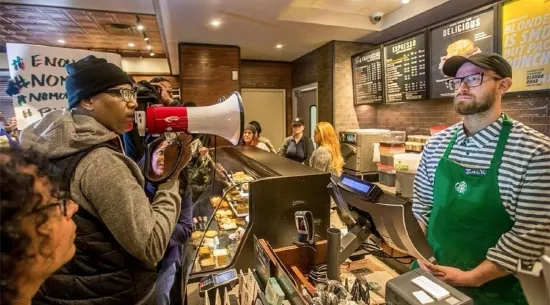On May 8, after years of declining influence, trade unions are making a comeback in the United States. Employees from large companies across the United States are increasingly organizing to demand better benefits, security and higher pay from employers. Data recently released by the National Labor Relations Board (NLRB) showed that from October 2021 to March this year, the number of union petitions submitted to the agency increased by 57% over the same period last year.

More than 250 Starbucks stores have submitted petitions. After winning the first vote at the end of last year, 54 stores have officially formed trade unions. Amazon employees recently voted to form the first warehouse in New York. Google fiber's contractor in Kansas City voted to form a union in March and became the first employees of the alphabet union to have the right to bargain with the company.
These efforts are resonating with the wider public. A Gallup poll conducted last September showed that 68% of Americans supported unionization, the highest level since 1965, when the support rate was 71%.
So why are trade unions welcomed by employees again?
1. Outbreak of COVID-19
Experts said that the biggest stimulus was the outbreak of COVID-19. Mark Pearce, a former NLRB chairman and current law professor at Georgetown University, said: "this epidemic has sounded the alarm and spawned two views: one is to reflect on whether there is another work and lifestyle; the other is that vulnerable workers are not only afraid, but also angry."
Jason Greer, a labor consultant, agreed with Pierce. "The epidemic is the biggest catalyst. Many people watch their families and friends die and suddenly face death threats, but many companies still want them to work the same or harder."
Many workers communicate their challenges through digital channels. Greer said, "when you track Apple Or Google's internal driving factors, I think this is largely related to digital channels such as slack. This is a perfect storm. People have more tools to contact and communicate with each other in such an environment. "
At the same time, companies such as Amazon and Google have the ability to meet the needs of "a society suddenly forced to stay at home". Experts said that the income gap between the company's leadership and ordinary employees has been widened. In many cases, executives' salaries have increased, while employees' salaries have remained unchanged.
2. Get more political support
Union organizers also find themselves in the most favorable political environment in decades. US President Joe Biden vowed to become "the most pro union president ever" and has always been outspoken in his support for the pro act, which aims to make the process of forming trade unions easier.
In his early days in office, Biden reformed NLRB and targeted the common practice of refusing to form trade unions. Last December, NLRB reached a settlement with Amazon, sending a signal to other companies and trade union organizers that NLRB will actively implement illegal punishment measures.
3. Domino effect
Experts said that the media's attention to the formation of trade unions by employees has triggered a domino effect. Coworker. Com, a website dedicated to helping employees organize trade unions Org co-founder and co executive director Jess Kutch said they don't even need to care about success.
For example, employees at Apple's retail store in Georgia said in April that they were inspired in part by Amazon employees who tried to unionize at a warehouse in Bessemer, Alabama. Derek Bowles, a member of the Organizing Committee of Apple's retail trade union, said he "has great respect" for the actions of Amazon employees, although the efforts to form a union have not been successful.
Experts say these young workers see each other's victory as a source of inspiration for their respective unions. Kutch and pierce cited the Google strike as an example. They said it was "not only an important moment in the technology industry, but also an important moment in the history of the labor movement".
In November 2018, thousands of employees of Google in more than 20 offices around the world went on strike to protest a report by the New York Times, which described in detail how Google protected executives accused of sexual misconduct. Strike organizers said "Google does not have a corporate culture suitable for everyone" and listed several requirements. Some of these requirements eventually became California law, while others were included in a settlement agreement with shareholders suing Google to deal with these events. (small)